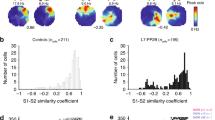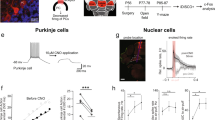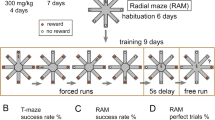Abstract
L7-PKCI transgenic mice, which lack parallel fiber–Purkinje cell long-term depression (LTD), were tested with two different mazes to dissociate the relative importance of declarative and procedural components of spatial navigation. We show that L7-PKCI mice are deficient in acquisition of an adapted goal-oriented behavior, part of the procedural component of the task. This supports the hypothesis that cerebellar LTD may subserve a general sensorimotor adaptation process shared by motor and spatial learning functions. *Note: In the version of this article initially published online, the third author’s name was incorrect. The correct name is Mohammed reza Hojjati. The error has been corrected in the HTML and print versions of the article.
This is a preview of subscription content, access via your institution
Access options
Subscribe to this journal
Receive 12 print issues and online access
$209.00 per year
only $17.42 per issue
Buy this article
- Purchase on Springer Link
- Instant access to full article PDF
Prices may be subject to local taxes which are calculated during checkout



Similar content being viewed by others
Change history
05 September 2005
Replaced R initial with "reza"
References
Schenk, F. & Morris, R.G. Exp. Brain Res. 58, 11–28 (1985).
Rondi-Reig, L. & Burguiere, E. Prog. Brain Res. 148, 199–212 (2005).
Thompson, R.F. et al. Int. Rev. Neurobiol. 41, 151–189 (1997).
De Zeeuw, C.I. et al. Neuron 20, 495–508 (1998).
Goossens, H.H. et al. Eur. J. Neurosci. 19, 687–697 (2004).
Goossens, J. et al. J. Neurosci. 21, 5813–5823 (2001).
Petrosini, L., Molinari, M. & Dell'Anna, M.E. Eur. J. Neurosci. 8, 1882–1896 (1996).
Leggio, M.G. et al. Exp. Brain Res. 127, 1–11 (1999).
Ito, M. Physiol. Rev. 81, 1143–1195 (2001).
Koekkoek, S.K. et al. Science 301, 1736–1739 (2003).
Martin, L.A., Goldowitz, D. & Mittleman, G. Eur. J. Neurosci. 18, 2002–2010 (2003).
Ito, M. Rev. Neurol. (Paris) 149, 596–599 (1993).
Thach, W.T., Goodkin, H.P. & Keating, J.G. Annu. Rev. Neurosci. 15, 403–442 (1992).
De Zeeuw, C.I. et al. Trends Neurosci. 21, 391–400 (1998).
Thach, W.T. Int. Rev. Neurobiol. 41, 599–611 (1997).
Acknowledgements
The authors thank M. Rutteman, V. Gautheron and F. Maloumian for technical support. L.R.-R. is supported by the Action Concertée Initiative 'Neurosciences intégratives et computationnelles' (NIC 0083), the Institut Fédératif de Recherche 52 'Transduction du signal: molécules à action centrale et périphérique', and the 'Groupement d'Intérêt Scientifique Longévité' (grant L0201). A.B. is supported by the Laboratoire Européen des Neurosciences de l'Action (LENA). C.I.D.Z. is supported by Nederlandse Organisatie voor Wetenschappelijk Onderzoek, the European Economic Community and Neuro-Bsik.
Author information
Authors and Affiliations
Corresponding author
Ethics declarations
Competing interests
The authors declare no competing financial interests.
Supplementary information
Supplementary Fig. 1
Hippocampal functions are not impaired in L7-PKCI. (PDF 834 kb)
Supplementary Fig. 2
Three-dimensional diagrams of the mean time spent by control and mutant mice at each location of the maze at different training phases. (PDF 931 kb)
Supplementary Fig. 3
Three-dimensional diagrams showing the mean time spent by the two groups of animals at each location of the Starmaze at the beginning (day 1) and at the end (day 13) of training. (PDF 1653 kb)
Supplementary Fig. 4
Abstract model describing the error-based cerebellar learning hypothesis. (PDF 301 kb)
Supplementary Table 1
General appearance and motor abilities of mice. (PDF 239 kb)
Rights and permissions
About this article
Cite this article
Burguière, E., Arleo, A., Hojjati, M. et al. Spatial navigation impairment in mice lacking cerebellar LTD: a motor adaptation deficit?. Nat Neurosci 8, 1292–1294 (2005). https://doi.org/10.1038/nn1532
Received:
Accepted:
Published:
Issue Date:
DOI: https://doi.org/10.1038/nn1532
This article is cited by
-
Synaptic basis of a sub-second representation of time in a neural circuit model
Nature Communications (2022)
-
A Liaison Brought to Light: Cerebellum-Hippocampus, Partners for Spatial Cognition
The Cerebellum (2022)
-
Neuronal Activity in the Cerebellum During the Sleep-Wakefulness Transition in Mice
Neuroscience Bulletin (2020)
-
Impaired cerebellar Purkinje cell potentiation generates unstable spatial map orientation and inaccurate navigation
Nature Communications (2019)
-
Mechanisms of cognitive-behavioral therapy for obsessive-compulsive disorder involve robust and extensive increases in brain network connectivity
Translational Psychiatry (2017)



